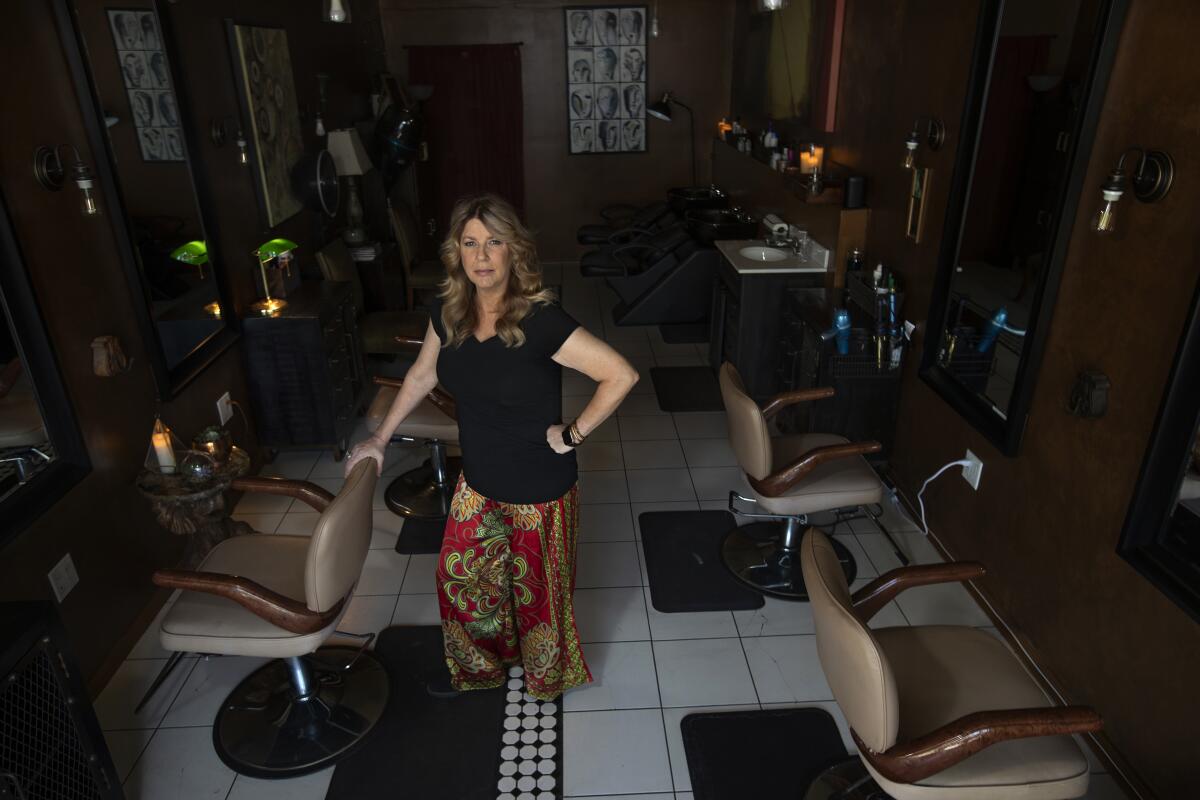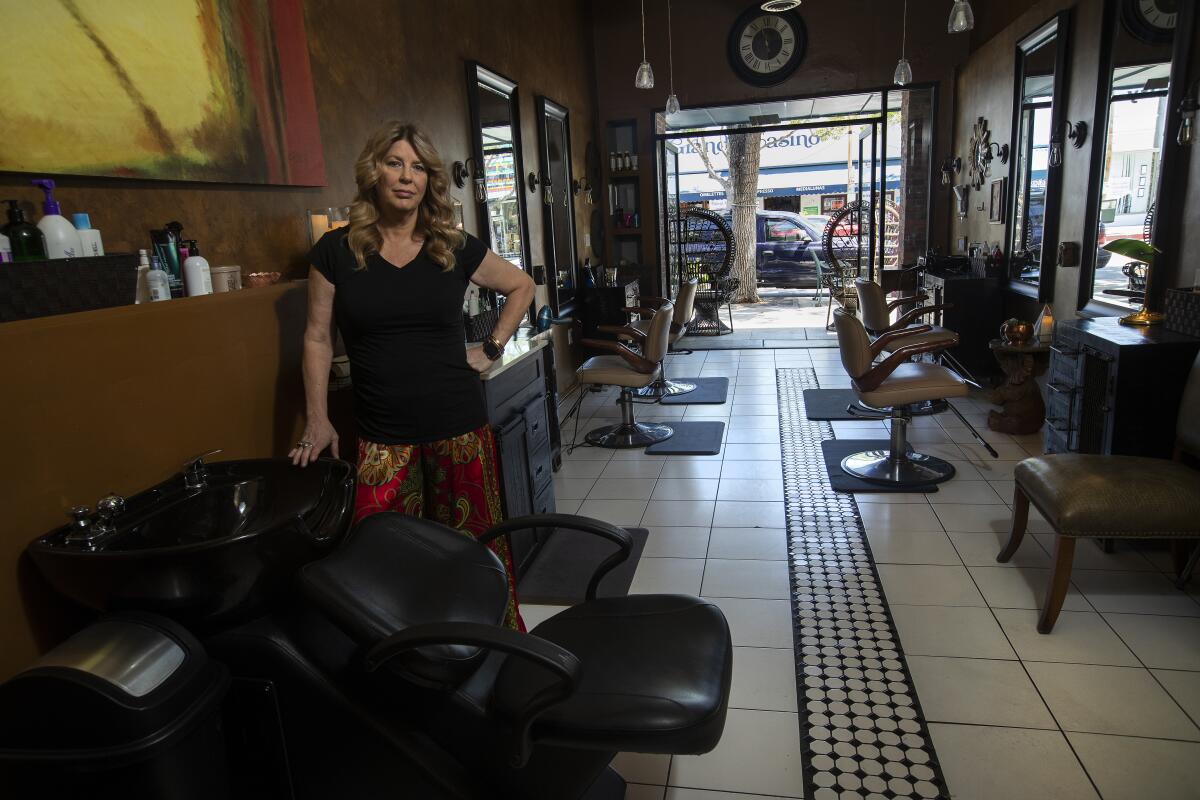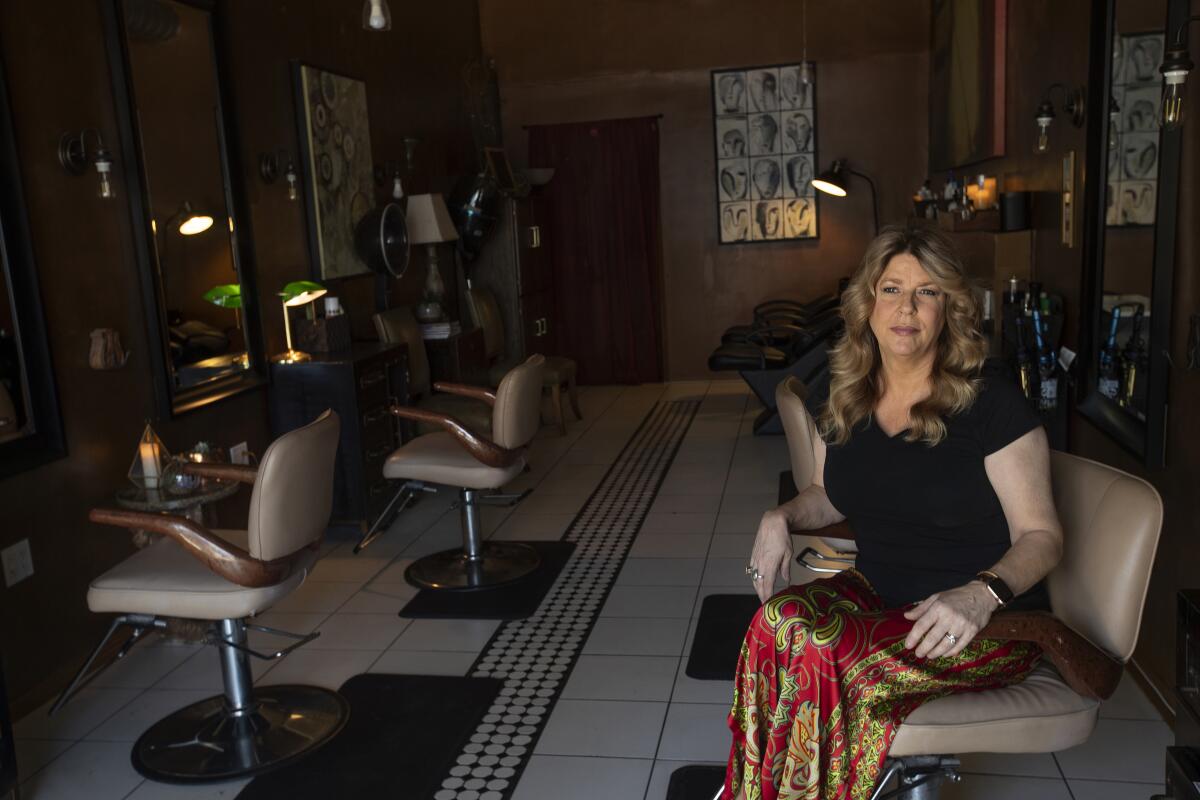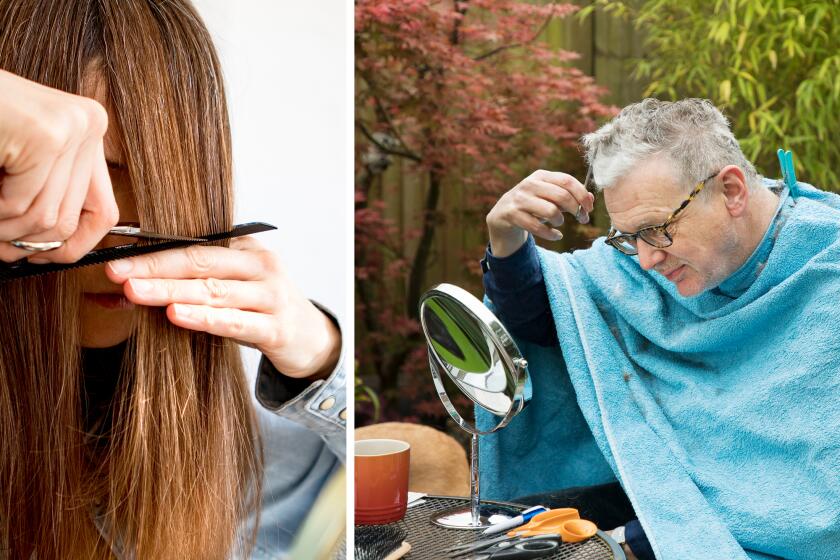What’s the future for California salons and barbershops? Hairstylists worry and wait

- Share via
Elaina Wilcox has set July 1 as her tentative deadline. If California officials don’t allow her to return to work at her hair salon by then, she might have to give it up or find other ways to survive.
Without an income, she doesn’t want to dig too far into her savings to pay the $3,200 monthly rent for Color & Craft Salon, the two-person operation in Culver City she opened in October.
Wilcox had a small salon when she was younger, following in her mother’s footsteps as a hairdresser, but her new 450-square-foot salon on Main Street is prime real estate in a booming area. Opening the salon last year was a dream come true. She built a clientele pushing 200 men and women, offering various hair services five days a week alongside a stylist she hired before the coronavirus raged.
Now, Wilcox wonders if her business will survive a full year as the stress mounts. “I’m all about being safe, and I’m all about doing this in a very mandated, very regulated way, but this is too much,” Wilcox said. “We’re swinging in the wind. We really don’t know what to do.”

Americans have been desperate for haircuts. They want to color their gray roots. Eyebrows are getting out of hand. They’re appearing on Zoom calls with bushy beards and, if they’re brave enough, buzzed heads. Those are minor inconveniences, the stuff of Twitter one-liners and memes, manageable until the country returns to normal. However, many of the people who provide those services can’t afford to wait it out.
Although some states have slowly begun reopening, allowing barbers and hairstylists to get back to work, those in personal grooming industries in California remain largely in the dark two months after establishments were ordered to close.
Last month, Gov. Gavin Newsom unveiled a four-stage plan for reopening parts of the California economy. The personal care sector — hair salons, nail salons and gyms — was deemed nonessential and included in the third phase alongside churches and sporting events without live audiences. California entered Stage 2 on May 8, though some counties are veering off the state’s guidelines with more aggressive plans.
Last Tuesday, the Professional Beauty Federation of California, a nonprofit that represents licensed beauty professionals, filed a lawsuit against Newsom in U.S. District Court in Los Angeles. Newsom’s office did not respond for comment on the suit.
People from across and outside California have been driving hours to visit salons in Sutter and Yuba counties, open despite stay-at-home order.
This week, hairdressers, barbers and other beauty professionals were given a better idea about what’s to come. On Monday, Newsom announced that more California communities could slowly begin to reopen as the state loosens its stay-at-home order. On the horizon, perhaps as soon as early June, would be in-person retail options and some sporting events without spectators.
“I’m confused,” Wilcox said. “Some people say it’s July, and some people are saying it could be as long as early September, which would be a nightmare.”
When they open, barbershops and salons won’t return to normalcy. They likely will restart with changes. There will be stricter limits on the size of gatherings and social distancing measures. Shops and salons, often doubling as social and therapeutic spaces, will function differently. The measures will dent bottom lines.
“It’s getting a little scary,” Graham Curran, a barber, said.
Curran, 33, and his wife, Mia Zdjelar, rent a 130-square-foot room at Salon Republic — the WeWork of hair salons — in Hermosa Beach. The couple don’t have to worry about paying rent for their salon during the shutdown. Salon Republic — with 23 locations in California, Texas and Colorado — assured all tenants that rent payments are dismissed until they can return to work.
The couple applied for a Small Business Administration loan six weeks before Curran woke up to a deposit of $1,000 at the beginning of the month. They later received their stimulus checks and a loan through the Paycheck Protection Program (PPP).
However, they’re still hustling to pay the bills. Curran, a full-time artist before barbering, is commissioning paintings and selling gift cards for their hair business. Zdjelar is producing hair-coloring kits and personalizing them for clients with dye, proper tools and a Polaroid of the family — her and Curran with their two dachshunds.
Zdjelar drops the kits off at her clients’ homes. Sometimes they come outside to greet her — at least six feet away, usually with their dogs. She’s available for a FaceTime appointment to walk the client through the process. She records a video for those who prefer not to FaceTime or don’t have access to it.
“A lot of my own self-worth lies in being in service of people, and when you remove my daily ability to do that, it plays a huge toll on your mental health,” Zdjelar, 31, said. “So it’s nice to feel like I’m at service.”
Unlike other hairdressers, Amanda Jenkins, a stylist at Leo by Paul Norton, a salon in West Hollywood, didn’t have the option to serve clients and make money when the shutdown began. She believes she contracted the coronavirus soon after she stopped working in mid-March.
She said she wasn’t officially tested but had symptoms. Once she felt better, she posted a video giving her roommate a basic fade as a tutorial on her YouTube channel. She’s since posted multiple how-to videos on Instagram and YouTube.
She applied for unemployment benefits as an independent contractor but hasn’t received any yet, and she hasn’t received a stimulus check.
For money, she’s selling beauty products. She initially didn’t entertain offering house calls for her clients, worried that she could spread the virus. But she has decided to do select house calls for those who reach out.
“I have disclosed with them that I was sick and now I’m well,” Jenkins, 32, said. “It’s up to them if they are comfortable with me coming to them. We can both wear masks and practice proper sanitation as usual.”
It’s a risk more and more people in the industry are taking the longer they go without incomes.
Danny de la Cruz, a 37-year-old father of four, has given haircuts since his barbershop in Monterey Park closed. He’s been offered $100 to drive an hour from his home in the Inland Empire to cut a client’s hair but prefers to work in his garage where he has a workstation set up. But his wife worries. He said he received a stimulus check from the federal government but didn’t qualify for unemployment benefits. He’s relying on his son, who works for UPS, to help pay the bills.
“I make sure to clean up before every cut,” De la Cruz said. “Just trying to make what I can for bills and what we somewhat need.”
For clients, it’s a tricky process to navigate as well. Evan Lovett, who works in online advertising, begged his barber for weeks to come to his house to give him a haircut. The barber initially refused but eventually caved. Last month, he went to Lovett’s house in Studio City to tighten up his client’s unruly hair and beard, which the client’s wife didn’t like very much. A week earlier, a hairstylist came over to cut the hair of Lovett’s wife and 6-year-old son.
In lockdown for weeks, Angelenos are yearning for crisp shape-ups and fresh fades. They are turning to internet tips and, increasingly, secret at-home appointments.
Lovett’s dog groomer also relented after declining business. He dropped his family’s three small dogs off for a grooming last month.
“She’s extremely paranoid about it,” Lovett, 41, said. “She wants to do like a drug-style drop-off and pickup.”
Wilcox said the idea of a rigorous investigation over house calls is enough of a deterrent for many hairdressers. She doesn’t want to reach a point where she would risk paying fines or losing her license. If anything, she emphasized, forcing people underground to offer services increases the chances of spreading the virus more than reopening salons where strict sanitization measures are taken.

When she’s finally able to reopen her salon, Wilcox asserted she wouldn’t work if she had the virus’ symptoms or allow clients to enter the salon with any. She said she would meticulously check temperatures and make sure she and her other stylist were six feet apart. She also believes the money from cuts and colors probably wouldn’t be the same as last year because necessary precautions would limit appointments. However, every dollar would help keep her salon afloat.
“I get it’s a learning process with this virus, but we are very well trained and regulated when it comes to sanitation,” Wilcox said. “We have months of sanitation courses that we have to pass before we can become a hairdresser. I know it’s because we touch the client, but there are ways of doing it in a responsible way.”
Wilcox said she got a stimulus check from the government but hasn’t received a PPP loan and hasn’t heard back after applying for unemployment benefits. She said she has a great relationship with her landlord and had her May rent deferred.
However, she’s afraid any potential government aid and her landlord’s willingness to help still wouldn’t be enough to save her business as missed rent accrues. For now, she anxiously waits, wondering if she’ll ever work in her own salon on a regular basis again.
“I was fine up until I found out we couldn’t come back at least until July,” Wilcox said. “And then I got real depressed.”
More to Read
Sign up for The Wild
We’ll help you find the best places to hike, bike and run, as well as the perfect silent spots for meditation and yoga.
You may occasionally receive promotional content from the Los Angeles Times.












